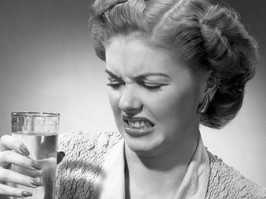dear asking for a friend,how often should i change my toothbrush? and is it true you can re-catch a cold from old germs that linger on your brush?signed, oral hygienedear oral hygiene,whether you’re using an electric toothbrush system, the manual drugstore kind or the
titanium toothbrush that comes with special anti-bacterial coating and retails for $4,200, changing your brush four times a year is a good idea.“as a rule of thumb, the soft-bristled toothbrush should be replaced every three months or when the bristles start to flare out,” explains dr. charles frank, president of the
ontario dental association. “the same applies for the head of an electronic toothbrush.”
flaring is a problem because over time, toothpaste, water, and a rigorous brushing motion can make the bristles on your toothbrush break and bend in all directions. this prevents your brush from doing its job — with flared bristles, picking up and removing food debris and plaque buildup becomes more difficult, leaving you more vulnerable to a host of problems, including
tooth decay and
gum disease.the impact flared bristles can have on your toothbrush’s performance and your overall mouth health is the only reason you’d want to switch things up a few times a year — usually. if you’re sick with seasonal cold or flu, different rules may apply. you might think that all those nasty germs can linger on your toothbrush, and while that can be true, there is
no evidence to suggest that it can get you sick again. when we fight off a nasty bug, we usually produce
antibodies that help prevent it from coming back, but this may not apply to everyone. it is recommended that those who are
immunocompromised or going through cancer treatment should discard their toothbrush after their cold or flu symptoms resolve.when it comes to oral health, regular checkups,
proper brushing and flossing twice a day can help keep your whole mouth healthy. eating whole grains, nuts, fruits and vegetables, lean proteins and calcium-rich foods is also important, as they provide the essential
vitamins and minerals your teeth and gums need. limiting sugar in your diet can help prevent
tooth decay and brushing your teeth immediately after consuming sugary drinks and foods can help you avoid
plaque, which forms after molecules combine with saliva and bacteria in your mouth. plaque can be detrimental to your teeth as it can dissolve enamel and lead to cavities.dental
experts suggest that if the bristles on your brush repeatedly flare, you’re probably brushing too hard, which could lead to
tooth sensitivity,
enamel erosion and may even make your
gums recede. frank advises against using a hard-bristle brush, and instead, recommends one with softer bristles to ensure it won’t harm your teeth and gums.“the best use for a hard-bristled toothbrush is to clean the grout in tile, as it is far too abrasive for use on the teeth,” says frank. “its use can result in a condition known as toothbrush abrasion where a groove or notch is worn into the tooth near the gumline, and this is not a good thing. it is much better to take a little more time and attention with a soft bristled brush.”the bottom line is that switching up your toothbrush every few months can help prevent gum disease and cavities, and while it may cost you a few extra dollars a year, it’s less expensive than dental work.
is there something about health that you (or a friend, wink, wink) have always wondered about, but are too embarrassed to ask? send a note to info@healthing.ca. we promise your ‘friend’s’ secret — and identity — is safe with us!
 3 minute read
3 minute read








